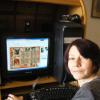Need a tutorial for a beginner to make clouds in Bryce 7
 launok
Posts: 793
launok
Posts: 793
I had seen some video tutorials but the one by David Brinnen say it's intensive. I have not looked at video yet. I am really only a beginner and needs something more simple. My aim is to add clouds in a rain/storm scene. But normal clouds to learn to create will also help. I have seen a written tutorial here but it's somehow confusing. When I follow the steps I don't get the menu they describe @ https://www.bryce-tutorials.info/bryce-tutorials/simple-clouds/
Steps 2 and 3, I am not following quite unless I am misunderstanding it. I have only get to step 3 at this point. When I press the "Frequency/Amplitude" button it takes me to the "Sky Lab". I click on "Cloud Cover" .... then what? I am lost!
Step 2: Adjust the cloud texture by double clicking which will open the material editor.
But double clicking on button as showing in image it opens sky lab and not material editor ... unless I am missing something at this point.
2. Adjust the cloud texture by double clicking which will open the material editor.


Comments
Launok - try David's tutorials, he does say intensive or for advanced users but they are simple to follow. I'm am using Bryce for so long now but you are rendering awesome little cities and towns, which I can only dream of doing. David has very good tutorials. Give them a try. Good Luck
The link you posted, I also did not have much success with it.
As I remember most if not all David videos are to make Volumetric Clouds and it sound to me like you're using the Native Bryce Skylab Clouds.
Volumetric clouds can be much more realistic but increase render times so much and do their limitations.
You'd be better off mastering the sky lab and for a rainy scene where you're probably not going to want much (if any) sky showing through will suit you better.
So very quickly:
In the sky lab/Cloud Cover tab you have 2 sorts of clouds, Stratus & Cumulus. You can choose to have either, both or none of these switched on.
The controls for both are the same and do the exact same thing.
Cloud Cover will increase the amount of sky covered by cloud as you slide the bar to the right.
Cloud Height will raise the layer of cloud in the sky as you slide the bar to the right.
Frequency will increase the frequency as you slide the bar to the right.
Amplitude is slightly different in that it accepts positive and negative values... So for instance if it's set on 0 and the bar is blue, slide it to the right and you get poxitive numbers, slide it to the left and the bar turns orange and you get negative numbers.
I would suggest looking in the sky presets for one that is close or one that you like and setting that as your sky and then entering the Sky Lab Cloud Cover control to examine what settings have been used and tinkering with them one parameter at a time to see how each affects your sky. If you set the little preview panel on the right to "Render In Scene (by clicking the downward arrow and chosing that option from the pull down menu), you get a good idea without having to be in and out of the Sky Lab all the time.
Hope this helps... I can't find any good tutorials online for you (and yes, the one you've found seems to be rubbish) but this might help to give you better overview of the Sky Lab and Cloud/Fog settings.
https://brycebasics.blogspot.com/search/label/Sky%20and%20Fog%20Palette
That's a Bryce 3 or 4 tutorial (scrape it ) Try this to get started. Go strait into the sky lab, Cloud Cover tab. Click & Highlight Stratus & Cumulus option. Under each window is a reset & edit option, Click edit. This takes you into the DTE. In the DTE on the bottom window click the top right side button. This takes you into the Texture Library. In the library select Clouds on the top roll you'll find stormy ( it's the 6th one) Select it then check out of the Library, Then check out of the DTE. After loading Stormy in both Stratus & Cumulus windows. Start playing with the sliders as Dave described. The second part of that tutorial uses spheres ( or Volume slabs ) with a volume material applied to them. Those can be edited in the material lab. Hope this helps you.
Thank you for the info regards clouds, I will have a look into this and try the Sky lab as well. I have actually not worked in this lab but there is always space to learn more!